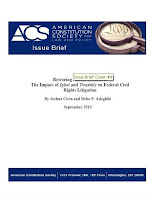The American Constitution Society releases new brief on SCOTUS decisions that undermine Civil Rights Enforcement
Over the last three years, this blog has attempted to sound the alarm about the Supreme Courts shift away from the enforcement and the intent of Civil Rights Legislation. With a series of subsequent decisions, the Courts have continuously raised the legal thresholds and pleading standards until we now have a system where litigants in Civil Rights cases must meet a nearly insurmountable burden of proof just to avoid dismissal or summary judgement.
By requiring plaintiffs in Civil Rights or discrimination cases to essentially prove the plausibility of their claims at the time of pleading and PRIOR to discovery, the courts have created a standard in which only the most egregious, most obvious, and least sophisticated acts could successfully be prosecuted.
The American Constitution Society has released a brief which details the Supreme Courts construction of new and onerous legal standards in the Twombly and Iqbal cases which undermine Civil Rights enforcement by limiting plaintiffs access to the courts.
By requiring plaintiffs in Civil Rights or discrimination cases to essentially prove the plausibility of their claims at the time of pleading and PRIOR to discovery, the courts have created a standard in which only the most egregious, most obvious, and least sophisticated acts could successfully be prosecuted.
It has become easier to coat various forms of discrimination with the appearance of propriety, or to ascribe some other less odious intention to what is in reality discriminatory behavior. In other words, while discriminatory conduct persists, violators have learned not to leave the proverbial “smoking gun” behind. ~ Third Circuit Court
The American Constitution Society has released a brief which details the Supreme Courts construction of new and onerous legal standards in the Twombly and Iqbal cases which undermine Civil Rights enforcement by limiting plaintiffs access to the courts.











